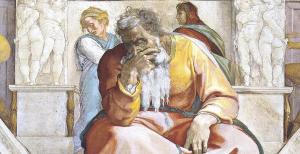
The Prophetic Books are Faith-Forming
Reading the prophets of Israel is tiresome work. I’m 31 chapters into Jeremiah, and I feel a bit like I did a few years ago at mile seven of a half marathon.
The prophet has us listening in on metaphors that don’t quite land. I will dash the people of Judah against each other like . . . jars of wine? We hear of symbolic action that seems over the top. Wear a loin cloth, then ruin it, so you can show the people how God feels about… a people who won’t cling to his loins anymore? Mostly, we suffer with the prophet and the people through long condemnations, statements of judgment and suffering that is to come. The narrative pieces—the prophet going to visit the potter, or getting thrown into a well—feel like moments of relief in the midst of Jeremiah’s long… well, Jeremiads.
Tiresome work, and yet key to deep faith formation. What the prophets teach us is something that can’t be put into doctrinal formulas or simple statements. “Jeremiah is about the last days before Judah’s exile” doesn’t come close to defining the reader’s experience. That would be like saying The Lord of the Rings is about the war in Middle Earth during the world’s Third Age. Isn’t it more truly about the brace of conies that Samwise roasts, and the despair the fellowship feels as they walk through dark dwarf tunnels?
Jeremiah Tests the Network
The prophets teach us that no despair is so complete that it reaches beyond the limits of God’s mercy. And this is something a person can only learn by walking with the prophet and his people through their despair. It’s like the old Verizon commercial. You test the network by walking into dead zones and calling out “Can you hear me now? What about now?”
Why is this network testing necessary? Because we are not only on a journey with Jeremiah in these pages. We are on a journey with Jeremiah’s God. This is the God who chose to follow Adam and Even out into the wild lands beyond the garden. It’s the God who walks with Israel in the wilderness. I wrote about this a bit in my first book. God is incarnate with God’s beloved people. That’s not just a New Testament image either. Jewish theologian Michael Wyschogrod says that incarnation is the right way to describe God’s presence with the assembled people, in the land, and in Torah.
So Jeremiah’s God seems to be doing very unGodlike things. God gets flooded by emotion. Sometimes God’s changes his mind. He rages and weeps and gets jealous and breaks promises. And yet somehow God can do all this without ceasing to be the eternal, changeless, always faithful creator of all that is. This is the deep mysterious path that the Bible takes us on. And it’s one we can only learn by walking.
Jeremiah’s Emotionally Volatile Companion
This means, as Abraham Heschel puts it, that “Jeremiah must learn the grief of God.” And we learn it along with him. God is exiled in Israel’s exile, homeless in her displacement. The prophet gives us words for “the dramatic tension in the inner life of God.” That’s incarnation talk.
So the prophets show that nothing could ever count as evidence that God has abandoned God’s people. Nothing. Including God showing up and saying “I have abandoned you.” The cup of wrath of chapter 25 is not so full as to drown the verses I read this morning.
I have loved you with an everlasting love,
Therefore I have continued my faithfulness to you.
There will come a day of feasting and dancing in the streets, when Judah’s miserable life will
be like a watered garden,
and they will languish no more.
So: we read the prophets to enter into the imagination of a God who is not afraid of joining us in the hardest parts of being human. God here is less a steady Om, more an emotionally volatile companion. God’s mercy can be fickle. We can find ourselves lying unloved and forgotten in the weeds.
And still, from the weeds, we can hear the voice saying what hardly seems true, but somehow must be: “I have loved you with an everlasting love.”










